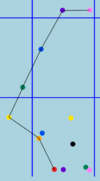Talk:Tag the hash achievement
Support. The achievement is well-defined and is a nice additional challenge for geohashers to attempt. --KerrMcF (talk) 23:35, 19 May 2024 (UTC)
Needs work It has a number of peculiarities compared to most achievements. The requirement that the hashes be closest *to each other* rather than to your home. A "genuine attempt" counts, but driving doesn't. It's also a bit difficult to understand - the first two sentences could be really improved. Stevage (talk) 02:12, 5 July 2024 (UTC)
- I've altered the proposal, because I strongly agree with your points on the peculiarities. A genuine attempt no longer counts, you have to actually reach each geohash, and driving is now a valid way to travel for the achievement. I think the poster originally intended for the achievement to be an "easier" version of the Endurance geohashing achievement, but that only complicated what was otherwise a decent idea. I've also hopefully improved the clarity of the proposal, it was a little difficult to explain with the previous restrictions. The requirement for the hashes to be closest to the previous day's is the entire point of the achievement, so that has remained. --KerrMcF (talk) 22:44, 14 July 2024 (UTC)
Do not oppose but it feels like it doesn't add much to the Consecutive geohash achievement other than increasing the chance that your streak will be broken by one unlucky point. I believe this is why the original proposal didn't have reaching the hash as a requirement, but that version definitely needed work on defining what counts as a genuine attempt, e.g. when the target point is in the sea. --PeterRoder (talk) 23:13, 14 July 2024 (UTC)
- I would say that the Tag the Hash restrictions also add more adventure and getting-out-of-your-comfort-zone than Consecutive does. I've added an example image of a hypothetical week's worth of geohash points, showing both the route for the Tag the Hash criteria and where those equivalent points would be in the user's home graticule. The consecutive geohash achievement would only require the user to reach a geohash, and they would likely be more inclined to venture to the one closest to home. Tag the Hash requires the user to venture further, which in this case, results in them having to be over 200km from home by the end of the week. Their choice whether they travel that distance from home or stay near to the previous geohash. Obviously, this example is less realistic than most cases, but if someone was dedicated to earning a high level of this achievement, it could add a significant amount of difficulty/enjoyment to the Consecutive achievement by having to go to points that you usually wouldn't favour. --KerrMcF (talk) 00:19, 26 September 2024 (UTC)
Needs work. The reason that the coordinates did not have to be reached per the original proposal is that each day otherwise would be hit or miss. If the next day's closest coordinates are inaccessible, you don't have a second shot like you do at the consecutive achievement. I think a solution would be to establish an honorable mention where you don't have to reach the coordinates, but make a genuine attempt, and define that as getting as close as possible. Examples: If the point is in the sea, you have to be at the closest beach. If it is in a house, you have to attempt an ambassadorship, and if refused (or if nobody is home) be on the closest publically accessible point. I'm on the fence regarding train wrecks, since you could always walk to get closer. --Fippe (talk) 11:20, 27 July 2024 (UTC)
- I like the honorable mention idea, it still keeps that original part to it and encourages people to continue their attempt, even if it's not the full achievement. The situation gets a little tricky if the nearest point is at sea, and the next day's nearest to that is further at sea, and the next even further, and every day counts by going to the same beach, but that seems like an unlikely scenario anyway. Maybe you can only have a maximum of one consecutive non-success, or something like that. --KerrMcF (talk) 00:19, 26 September 2024 (UTC)
